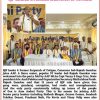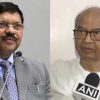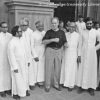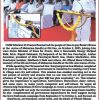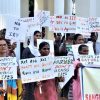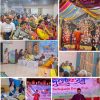Goa is abuzz with excitement as vintage bike and car owners, users, collectors and fans are decking […]
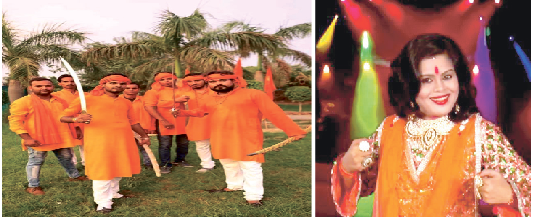
KHOON SE TILAK KARO
Jan 26-Feb 01 2019, Politics January 26, 2019THE NEW STARS: The phenomenon that stridently highlights that “Hinduism is under siege”, ironically, surfaced around the time the BJP came to power with a massive mandate in 2014. (above) Laxmi Dubey; (left) Sandeep Chaturvedi (with sword, second from left), a Bajrang Dal member, in one of his videos
BY MANSI DUA
In the run up to the parliamentary elections the BJP is using every method including ultra Hindutva bhajans such as ‘Khoon se tilak karo, goliyo se aarti’
Laxmi Dubey grew up in Bhopal, Madhya Pradesh, in a family of singers. By the age of seven, she was singing bhajans on stage and at small gatherings. “We were not this aggressive. I remember singing ‘Hindu-Muslim bhai bhai’ in school, but now I am angry at what is happening,” says the 28-year-old singer.
Anger is the hallmark of Dubey’s music; it is reflected in the bristling orange colour-scheme of her videos, and the lyrics that urge her audience to dramatic violence: Khoon se tilak karo, goliyo se aarti. That’s a line from her hit song, Har ghar bhagwa chhayega, which has been watched 20 million times on YouTube since 2017, when she uploaded it. Her songs, composed to a melody-less repetitive beat, speak — in the same breath — of Hindus beheading enemies and worshipping Lord Ram.
Dubey is among a group of singers — mostly members of “upper caste” communities from small towns in the northern heartland — who evangelise a militant form of Hinduism through their songs and videos. Almost all of them have bypassed traditional media to find their audience through the internet. The songs pledge to ban cow slaughter, build a Ram temple at the disputed site in Ayodhya, and pulverise Pakistan by the firepower of the new Hindu, who is often urged to rise and protect his religion.
In Bihar’s Chhapra town, 22-year-old Saurabh Pandey’s phone buzzes with requests to upload Hindutva songs on his YouTube channel. The self-proclaimed kattarwadi (staunch) Hindu is in his final year of B Sc and manages the Deva Music channel (over 1.7 lakh subscribers) along with his brother. They curate a mix of Bhojpuri songs, which clearly target the minority community (making “Pakistani mullahs” chant Ram’s name is a recurring wish). Pandey is unapologetic about stirring hate against another community.
“That’s what people demand. Had we been doing anything wrong, YouTube would have blocked our channel,” he says.
Pandey, who was a BJP worker till a while ago, says that such songs became popular around 2013-14. They are now played at political rallies and shobha yatras. A number of these songs are also remixed to make them dance-worthy. “People listen to them in programmes organised by Hindu organisations, and during festivals like Ram Navami and Hanuman Jayanti,” Pandey says. He hints at the political support for his work. “Only people with a strong backing can do this work.”
Sometimes, the soundtrack of rage spills over into the streets, with grievous implications. In March last year, Ram Navami celebrations in Bihar, West Bengal and Telangana took a violent turn when armed Hindutva rallies played “provocative anti-Muslim” songs while passing through Muslim areas. Eyewitnesses told news reporters and the police that Sandeep Chaturvedi’s Topiwala bhi sar jhuka ke Jai Shri Ram bolega was one of many such songs played in Bengal and Bihar. Chaturvedi, 23, who is also a Bajrang Dal member, does not believe his song is provocative.
“My song is within the acceptable boundaries and was not intended to incite violence. A topiwala can be anyone. Even if the song was playing near a mosque, what was their problem?” says the self-proclaimed nationalist singer from Ayodhya.
The phenomenon that stridently highlights that “Hinduism is under siege”, ironically, surfaces around the time the BJP comes to power with a massive mandate in 2014.
So what turned these singers to this cause? Dubey attributes her change of heart to the exposure to the “right” kind of media. A former print media journalist, she said she found her “inner calling” after her stint in the electronic media revealed “how the lives of multiple Hindu girls got spoilt because of love jihad.” She says she works for IND24, a media channel in Madhya Pradesh, which was founded in 2015 — though she does not specify her role. Dubey performs in shows organised by the RSS and VHP — and also campaigned for the BJP ahead of the recent assembly elections in her state. She says her songs speak of a new confidence in her religion.
“Hindutva means uniting all Hindus who have been divided on the basis of caste under the saffron flag,” she says.
Dubey credits the internet for the wide reach of her music. “Earlier, it was difficult to release songs on CDs. Now it is easy to get your voice heard,” she says, adding that she has a team of 28 people to help in the production and editing of her videos. Dubey denies she is against any religion and is only focussed on propagating and protecting Hindutva, which she believes is her constitutional right. “My one line has created a rage, ‘Hindustan me rehna hoga, Vande Mataram kehna hoga (If you want to stay in India, you will have to say Vande Mataram)’, but I don’t see anything wrong in that,” she says.
In December 1992, as kar sevaks mobilised near the disputed Babri Masjid site, Sanjay Faizabadi was 16. His family was one of the many who organised food, water and milk for the stormtroopers of the Sangh Parivar who would go on to raze the mosque.
“My family served them because they are Hindus,” he says. By then, he was singing Bhojpuri and patriotic songs, having failed to get into the Indian Army. In 2004, he wanted to release a Bhojpuri DVD album but did not get the requisite permissions. The internet came as a blessing to the 42-year-old, when he released his songs Pakistan teri aukaat and Pakistan hila denge in 2016, with 12 million and 8 million views, respectively. Politically, all of the singers appear to be sympathetic to the BJP, who they see as the protector of “Hindu interests”. One of Faizabadi’s older songs is Baar baar PM ho Modi and Dubey, too, sings of a second term for the PM.
While they shrug off the recent defeats in the Assembly elections, they are angry at the lack of progress in the Ram Mandir case despite “their” government being in power.
“The mandir should be built only after the Supreme Court verdict. But if not, people will be disappointed in the BJP. Don’t know how it will affect their vote in 2019,” he says. Adds Chaturvedi: “We cannot depend on our Constitution for everything.”
Courtesy: Indian Express
